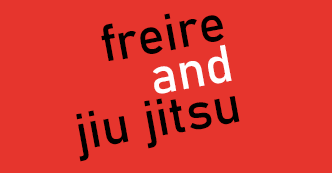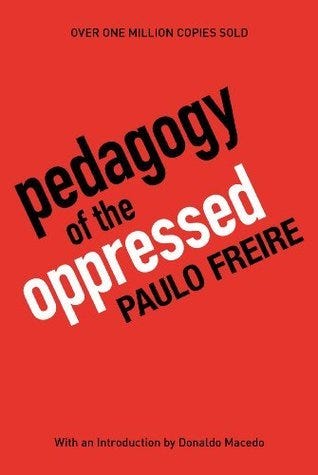Paulo Freire and Jiu Jitsu
A short discussion on how BJJ can benefit from Paulo Freire's seminal work "Pedagogy of the Oppressed"
Brazilian Jiu Jitsu is, nauseatingly, described as a physical chess match. But beyond the physicality lies a deeply pedagogical experience—one where students learn not only how to move, but how to think, adapt, and grow. As BJJ continues to globalize and evolve, analysis of the sport leads to introspective questions. Questions about how it is taught, who holds power in the gym, and how students engage with knowledge become increasingly relevant.
Enter Paulo Freire, a Brazilian educator and philosopher whose seminal work, Pedagogy of the Oppressed, offers a radical rethinking of education as a liberatory practice. Though Freire’s work was originally aimed at literacy education for the poor in Brazil, its core ideas—dialogue, critical consciousness, and the rejection of authoritarian teaching—resonate powerfully within discussions of Education to this day. Which, by extension of the innate learning experience that founds BJJ, links these two worlds together.
So, today I’ll be exploring Freire’s key concepts and contextualizes them within the practice and pedagogy of Brazilian Jiu Jitsu, offering insights for students, instructors, and gym owners alike. I speak not as a high level BJJ practitioner, I’m at the moment only a hobbyist purple belt who just happens to be really into K-Guard shenanigans. However, I am quiet adept at educational analysis given I’m doing a PhD in Education, so that can speak for itself I guess. Simply put, I’m just really invested in both educational research and jiu jitsu, and so this discussion is something that plays into my strengths.
A Brief Overview of Pedagogy of the Oppressed
Published in 1970, Pedagogy of the Oppressed is both a critique of traditional education and a call to action for a more humanizing, liberatory approach. Freire’s central concern is the dehumanization caused by systems of oppression, particularly in education. He argues that traditional education often mirrors oppressive societal structures, treating students as passive recipients of knowledge rather than active participants in their own learning.
Freire’s work is grounded in his experiences teaching literacy to impoverished communities in Brazil. He observed that education could either reinforce the status quo or become a tool for liberation. His pedagogy is built on the belief that education should awaken critical consciousness—what he calls “conscientização” (literally “awareness” in Portuguese)—enabling learners to perceive social, political, and economic contradictions and to take action against oppressive elements of reality.
Banking Model vs. Dialogical Education
One of Freire’s most influential critiques is of what he calls the “banking model” of education. In this model, the teacher is the sole authority, “depositing” information into passive students who are expected to memorize and regurgitate it. This approach, Freire argues, stifles creativity, critical thinking, and agency.
In contrast, Freire advocates for a dialogical model of education, where learning is a collaborative process. Teachers and students engage in dialogue, learning from each other and co-creating knowledge. This model emphasizes mutual respect, inquiry, and reflection. It transforms the classroom from a site of domination into a space of liberation.
Critical Consciousness and Liberation
At the heart of Freire’s pedagogy is the development of critical consciousness. This involves more than just awareness; it is the ability to critically analyze one’s social reality and to act upon it. Freire believed that true education must lead to praxis—reflection and action upon the world in order to transform it.
This process is inherently political. Freire does not see education as neutral; it either serves to domesticate or to liberate. For the oppressed, developing critical consciousness is a step toward reclaiming their humanity and reshaping the structures that dehumanize them.
Applying Freire to Brazilian Jiu Jitsu
While BJJ may seem far removed from the literacy classrooms of 20th-century Brazil, the parallels are striking. The gym, like the classroom, is a site of learning, power, and identity formation. Applying Freire’s ideas to BJJ invites us to rethink how knowledge is transmitted, how hierarchies are maintained, and how students can be empowered.
Gym Hierarchy and Power Dynamics
Most BJJ gyms operate within a clear hierarchy: black belts at the top, white belts at the bottom. While hierarchy can provide structure and safety, it can also mirror the oppressive dynamics Freire critiques. In some gyms, instructors are treated as unquestionable authorities, and students are expected to follow without inquiry. This dynamic can discourage critical thinking and self-expression.
Freire would challenge this model. He would ask: Are students being treated as co-creators of knowledge, or as passive recipients? Are they encouraged to question, explore, and innovate, or merely to obey? A Freirean approach would seek to flatten the hierarchy—not by eliminating expertise, but by fostering mutual respect and dialogue between teacher and student.
Teaching Methods: Repetition vs. Exploration
Traditional BJJ instruction often relies on repetition: drilling techniques over and over until they become second nature. While repetition has its place, it can become mechanical if not paired with understanding. Freire warns against rote learning that lacks context or critical engagement.
A Freirean pedagogy would emphasize exploration and problem-solving. Instead of simply showing a technique and expecting students to mimic it, instructors might pose questions: “Why does this grip work here?” “What happens if your opponent does X?” This approach encourages students to think critically, adapt techniques to their own style, and understand the underlying principles of movement and leverage.
Student Empowerment and Critical Reflection
Freire’s vision of education is deeply empowering. He believes that learners must see themselves as capable of shaping their own reality. In BJJ, this means helping students become not just better grapplers, but more confident, reflective individuals.
This can be achieved through practices like:
Open mat discussions where students share insights and ask questions.
Peer teaching, where advanced students help beginners, reinforcing their own understanding.
Reflective journaling, encouraging students to think about their progress, challenges, and goals.
Such practices align with Freire’s emphasis on praxis—combining reflection and action to foster growth and transformation.
In most cases, these exist but are not formally structured to be part of the gym learning experience. As such, the application across gyms can, and is, spotty.
Challenges and Opportunities in BJJ Pedagogy
Implementing a Freirean approach in BJJ is not without challenges. Many gyms are steeped in tradition, and questioning authority can be seen as disrespectful. Instructors may fear losing control or being undermined. Additionally, not all students are ready or willing to engage in critical dialogue; some prefer clear instructions and structure. Others may just think its a waste of time and that actually it’s all wrong because they saw a YouTube video by some failed drop-shipper. Ultimately, that’s this is probably the biggest hurdle.
However, the opportunities are profound. A more dialogical, student-centered approach can lead to deeper learning, greater retention, and a more inclusive gym culture. Something I think is quite necessary in this day and age. It can empower students from marginalized backgrounds, challenge toxic hierarchies, and foster a sense of community and shared purpose.
Moreover, BJJ itself lends well to Freire’s ideas. It is inherently adaptive, creative, and experiential. Every roll is a dialogue, every technique a question and answer. By making the pedagogy reflect the art, we can create learning environments that are not only more effective but more humanizing.
Conclusion
Pedagogy of the Oppressed challenges us, educators of all specialty, to rethink education as a liberating practice rooted in dialogue, critical reflection, and mutual respect. When applied to Brazilian Jiu Jitsu, Freire’s ideas invite us to question traditional hierarchies, embrace student agency, and create more inclusive, empowering learning environments.
BJJ is more than a martial art; it is a space where people learn about themselves, their bodies, and their relationships with others. By infusing Freirean principles into the pedagogy of BJJ, we can ensure that this learning is not only technical but transformative. Which, ultimately, every teacher strives to have their lesson make an impact on their student.





Great article. I was not familiar with this book, but love the ideas here.
Interesting article - thought provoking. I wrote about the transformation one gains in education and life from martial arts - the opposite perspective of this article. 👍
If interested just look at my posts; the summary or the full article about Martial Arts improving education outcomes